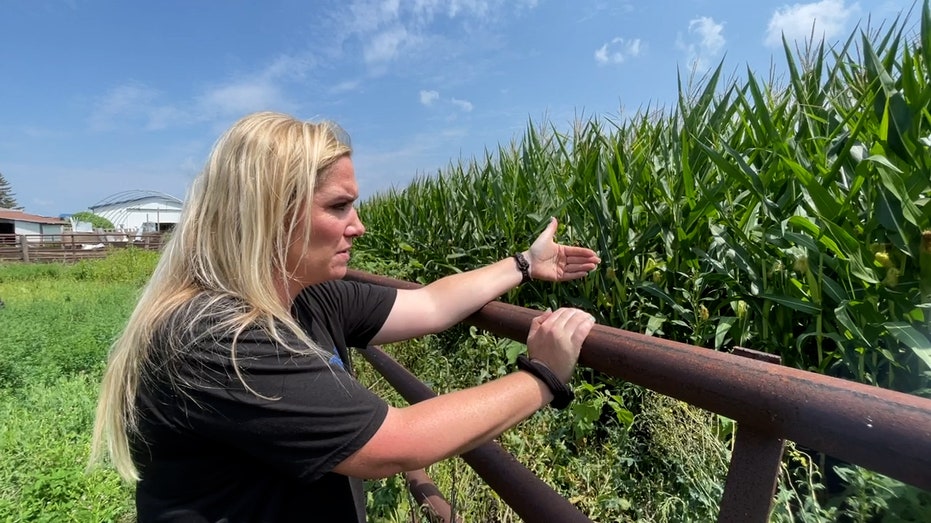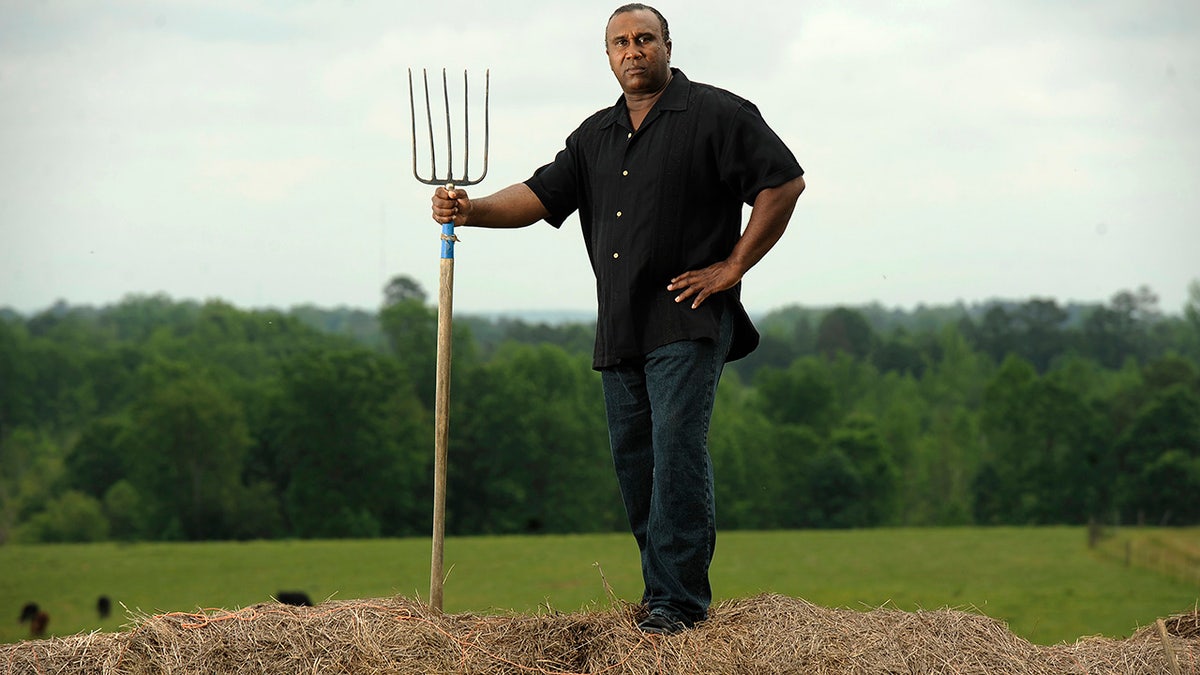A Discouraged Boy
Crabapple's boy had read that touching Thanksgiving story about the chap who ran away from home when a lad and went to sea, and was not heard of for several years, and how on every Thanksgiving Day his fond mother set a plate for the wanderer and kept a seat for him at the table, and how his gray-haired father, when he asked for the blessing, prayed for his wayward son — prayed that he might return safety to his paternal roof.
And then one Thanksgiving Day, when they had about given him up on him for dead, although the plate and the vacant chair told the story of a mother’s undying hope, just as the family had set down to the Thanksgiving dinner, there came a rap at the door.
No be didn't. He instead took his son by the collar, led him into the woodshed, and used a barrel stave on him. [A barrel stave is a narrow strip of wood that forms the sides of a barrel. Staves are placed edge to edge to create a liquid-tight seal at the stave joint. Jimmy Crabapple's father used it as a switch in place of using a wooden spoon, a belt, or a paddle to spank his son for running away.]
Back in 1800s America, children running away from home was done for a few reasons. At the time, child labor laws and restrictions were so non-existent that children were basically in the same class as slaves. Yes, while some people today might think that that's not so, it is the truth. Children were people enslaved by others.
“Come in!” cried the father. And, at that moment, their son bounced into their home wearing a sailor’s uniform and tarpaulin hat, just home from a long whaling voyage. Such rejoicing as there was in that house. How his father shook him by both bands, how his mother wept over him and embraced him; and how all his brothers and sisters, and aunts, and cousins hung around his neck and tugged at his sailor jacket.
It was worth the braving of the seas to meet with such a welcome on his return. He sat at the feast in the chair that a mother’s doubtless love and hope and recollection had always placed for him and never was there a happier Thanksgiving since that cherished anniversary was invented.
Crabapple’s boy wept over that story every time he read it, and he got to wondering whether such a fuss would be made over him should he run away from home and then turn up again some Thanksgiving Day. He thought about it so much that he finally decided to test the business out. He would see how the folks would act when he played the prodigal's return.
So about a week before Thanksgiving, he ran away from home. He didn't go to sea, because the sea was too far off, and he couldn't make much of a voyage in a week, anyhow. He got a job in a tanyard, grinding bark, which answered all the purpose, for he could imagine his "bark was in the sea" as he rode the old horse around the circle.
He called the mill the world and imagined himself sailing around the world every revolution. When the week was up he started for home. He fancied himself so much tanned by the occupation he had followed that his parents would hardly know him. He imagined he had picked up a good many hid ears, anyhow.
With a beating heart, he approached the paternal mansion. He looked in at the window and saw the folks just sitting down to the Thanksgiving supper.
A chill of disappointment crept over him as he saw there was no vacant chair, and there was no idle plate anywhere on the table. He listened at the door when the blessing was asked, but although several prophets were honored with flattering, no his name wasn't mentioned.
This was a little hard on the boy who had run away from home and was liable to turn up on that or any succeeding Thanksgiving Day. Relations didn’t seem to cluster around the hearthstone to any great extent.
So while repressing a chilling foreboding that arose in his breast, he flung open the door, rushed into their midst, and exclaimed: "Father! Mother! 'Tis I, Jimmy Crabapple, your son! I'm home again! I'm home! I'm home!" And with that he, threw himself into his father's breast, sobbing convulsively.
And what did his father do? Did he cry and slobber tears over him, and call out "Oh, thank the Lord, my long lost boy is home"?
Young Crabapple was punished for running away while his brothers and sisters danced around on the back stoop in an ecstasy of joy. All while his mother screamed, "That’s right, Ambrose! Give it to him! Learn him better than to run away from home again and make us sick with worry."
The boy was then sent to bed without any Thanksgiving supper at all, and threatened with being deprived of both Christmas and New Year if he ran off again. It's said he never ran away again.
The above was published in 1875, and a few things can be learned from this story.
Many children, like Black slaves, ran away from lives of bondage or abuse. While many ran away to the cities where they could blend in. Many found work as cooks and servants, newspaper boys, and factory workers getting a fraction of what adult workers would get paid. Many were injured and cast aside as there was a surplus of runaway children to be had as labor in all sorts of industries including in the mines at the time.
Other children, especially those from large very hungry families, ran away to escape the filth, squalor, and congestion of the cities at the time. Many saw living in sewer pipes or under stairs somewhere as being a better alternative than being packed with ten others into a 12-by-12-foot room.
And yes, many children, many like my own grandfather, ran away from abuse at home and went to sea to work aboard ships. Many made the sea their lives. As for many of the children who worked in the coal mines, in the cities, on the docks, or on ships, many went West seeking freedom and better lives. Many ended up working on cattle ranches, were part of the first cattle drives, herded livestock, tended oxen, and were indeed some of America's first "cow-boys."
American Indian children in boarding schools were often separated from their families and communities, which led to many of them running away from those schools. Believe it or not, even though many of them had to ride trains to get to those Eastern schools, many of those children ran away and tried to walk home. Yes, all out of a basic human need to return to a life they missed and understood, a life where they were loved and people didn't treat them as lower-class citizens.
Let's remember that many of those children tried to assimilate into White Society, including immersing themselves in learning American English while being forced not to speak their own language. Most American Indian children runaways ended up back on Reservations where they felt safer and were not looked down on.
As for young Jimmy Crabapple, he was a teenage child who loved a sentimental story about a son who was missed for a very long time, loved, appreciated, and even honored with an empty chair. That tells a great deal about Jimmy.
To young Jimmy, to get that sort of love he yearned for, to get that sort of wealth of being loved like that, to get that which he wanted more than anything in the world, that which he wanted to have so much that every time he heard that story read that he would cry, he knew that all he had to do was run away at Thanksgiving -- and return soon afterward. After all, that's the storyline. To his way of thinking, what not follow the storyline and he'd get the same results.
So yes, that's the story of Jimmy Crabapple. That's what he was all about. His plan was not to run away for good to seek a better life. He just wanted to stay gone long enough to be missed. And yes, in his young mind, a week would suffice to accomplish what he needed. He figured a week being gone with be enough for his parents and siblings, aunts and uncles, and everyone to miss him. All he wanted was to be loved with adulation upon his return.
What he didn't know was that children should never run away from home. While it makes parents crazy with worry, it also doesn't serve any purpose -- especially if a child is doing it for the reasons that Jimmy Crabapple did in 1874. Though he wanted to be missed and loved, no, it's never smart to run away from home for any reason.
Of course, his young easily influenced mind told him that all he had to do was run away to be loved just like that other boy in the story. He didn't know that sometimes stories are just stories.
While he believed in his heart that if he ran away, he would be missed -- he didn't understand what that would do to others. He believed that if he ran away, that he would be loved. After all, he heard it in a story. And as all children know, stories never lie.
Sadly, Jimmy Crabapple learned that sometimes a story, even a story of a young man who went to sea and returned to a loving family, is just a fairy tale, a tall tale, a yarn, all fiction, and has nothing to do with real life. He learned that fact of life while peering in the window of his home and seeing there was no mournful somber air to their Thanksgiving day. He saw his brothers and sisters playing and no one seemed to be acting even close to as depicted in that story that he cried over every time he heard it.
He learned that though it came with a long spanking that he received from his father, he learned the hard way that he was certainly loved.
Whether or not he realized it then is anyone's guess, but it's hoped he learned that disciplining a child for running away is an act of love. It is a way to correct behavior and protect the child's safety. It is a way for parents to demonstrate that they care enough to set boundaries and guide them toward making better choices. He learned that on that day, and would be thankful for the lesson for the rest of his life.
While I don't know if Jimmy Crabapple considered his father using a barrel stave on his posterior as either lovingly or constructive, it was certainly a sign of love. I would certainly say it was, especially when it comes from a loving parent who feels they've lost control of their kid -- and maybe they feel helpless when their child runs away. Of course, since Jimmy is said to have never run away again -- he must have felt his father's lover pretty good.
So all in all, while Jimmy Crabapple might not have thought so that day, his parents gave him a lot of love. Yes, even if it wasn't the warm and fuzzy love that he was looking for. He learned that love can come in different forms. And yes, that can be a tough lesson to learn. A tough lesson that he should have been thankful for learning at a young age.
For Jimmy, he learned that love can sometimes be in the form of a spanking. Of course, that was probably a tough lesson to learn on Thanksgiving back in 1874. But then again, I'm sure it would be just as hard for some children to learn today.
Tom Correa

222.jpg)
.png)






.jpg)






